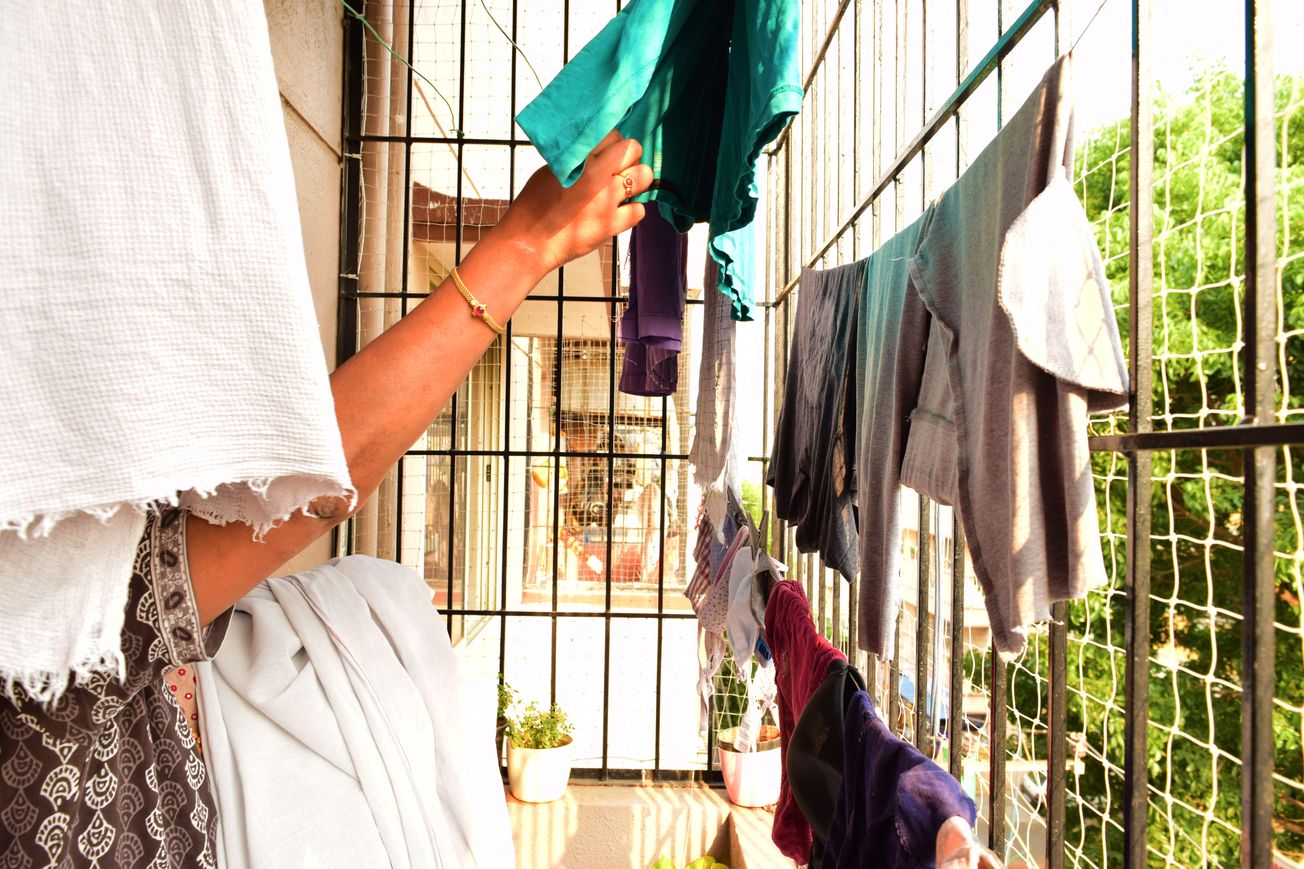Image Courtesy: Author
As India battles another deadly pandemic wave, the burden of household and care work for women has increased. In normal circumstances, thirty-two-year-old Kamlesh, a domestic labourer in Delhi, would start her day at 7:30 a.m., tending to chores at her employer’s home before heading back to her own home to repeat some of the same chores. A mother of three, Kamlesh considers herself lucky when she manages to get a total of three hours of rest in a day. At her employer’s place which has four members, she is engaged in routine cleaning duties and lending assistance in the kitchen. While the chores in her employer’s home and her own are similar, Kamlesh is only remunerated for the former. Indian women spend more than four hours on housework per day, nearly 577% more than men, and 40% more time than women of South Africa and China spend on housework, according to a time use survey conducted by the Organisation for Economic Co-operation and Development.
The National Sample Survey of 2011-12 says there are around 3.9 million Indians employed as domestic workers by private households, of which 2.6 million are women. A job site survey found that domestic workers or “house help” as they are commonly called, were the worst paid in India, even lesser than nannies and car drivers who also earn low wages. While house help workers (mostly women) were paid as little as INR 5,000 (55 EUR) a month in Kolkata and INR 10,000 (110 EUR) per month in Ahmedabad, drivers (almost always men) were paid nearly the double.
On the other hand, there is complete erasure of women’s household labour done in their own homes. Framed as their “own work” it is labour that is considered undeserving of recompense. Kamlesh says if she was to ever get wages for her “own” housework, she will most likely quit her employer and spend more time caring for her children as they are quite young and require her presence more.
According to the National Sample Survey on time use, Indian women, largely homemakers, spend nearly 17% of their day on unpaid domestic work and 2.6% on unpaid caregiving services for household members. In contrast, men spend only 1.7% and 0.8% respectively on these activities. There is also no respite for women when they fall sick. 64% of women in the survey said they had no choice but to carry out the housework, as there was no one else to help out and that “domestic chores are often prioritised above personal wellbeing”. This is no different for Kamlesh who told me that she doesn’t receive any help for her chores from her husband when she’s ill. Her sister-in-law, who lives nearby, sometimes helps her out.
Women spend eight hours lesser than men on learning or social and cultural activities according to data gathered by Ministry of Statistics and Programme Implementation between 1988 and 1999. This gender disparity can be attributed to time poverty faced by women in India, whose heavy load of domestic tasks leave them no room for leisure. Nisha Srivastava, Visiting Professor at the Institute for Human Development says wages for domestic labour in their own households might help women overcome time poverty to some extent. For instance, if they can afford time-saving gadgets or appliances, it will help reduce the amount of manual labour.
Feminists have been asking for wages or remuneration for domestic labour since the 1970s. In her book Wages against Housework (1975), scholar and author Silvia Federici says, “By denying housework a wage and transforming it into an act of love, capital has killed many birds with one stone.”
The conversation around wages for women working in their own homes was spurred recently in India, when actor-turned-politician Kamal Haasan announced salaries for housewives as part of the election manifesto of his political party, Makkal Needhi Maiam. Congress MP Shashi Tharoor welcomed Haasan’s announcement publicly. The Dravida Munnetra Kazhagam president MK Stalin also promised a salary of Rs.1,000 per ration card holder among housewives. If either party promising these wages are elected, the implementation of this policy will be a massive undertaking. Experts claim this to be a signal of political parties finally recognising women as a valuable vote bank. Anjor Bhaskar, an economics faculty member at Azim Premji University says the expenses in Tamil Nadu alone would stand at an estimated INR 33,000 crore (3.6 billion EUR), if they were to meet the demands of two to three crore (20-30 million) ration card holders in the state, assuming each card will have a female household head. “This is almost one-sixth of the state Mahatma Gandhi National Rural Employment Guarantee Act budget which amounts to 6-8,000 crores (664 million-885 million EUR) and nearly one-third of the public distribution system’s budget of Rs. 1 lakh crore (11 billion EUR).
However, there is resistance from people who embrace the patriarchal concept of housework being a woman’s “natural” role. Forty-six-year-old Divya Sharma, a homemaker in Bengaluru, believes her family’s love and support is compensation enough for her domestic labour. “From childhood we were taught that our house is our workplace, and we do the chores faithfully and honestly,” she says. She has partial economic independence and employs a domestic worker. She finds the time to rest and pursue her hobbies. Her caste privilege allows her to delegate domestic work to women like Kamlesh and monetary compensation for her own labour isn’t a concern.
Geetha V., social historian and activist, has argued that rather than help women, assigning wages to domestic work will “mock the utter precarity of domestic workers and housekeeping staff, who are often not ‘visible’ as a workforce.” She says they are constantly bullied, despite their contribution to lessening the load of domestic labour of middle and upper classes. Some flag the loss of women’s agency over these earnings and say it would likely be taken away by their husbands to buy liquor. Challenging this, Pallavi Pareek, the Founder of Ungender, a legal advisory firm says this can very well also be the case with salaried working women. “Quantifying their (women’s domestic) labour will be the first step towards including them as decision-makers in the economy,” she says, reiterating the need for a shift in perception.
Lack of financial stability or source of income oft confine women to unfavourable conditions. It was found that nearly 50% of women in India do not have savings or a bank account, while 60% had no assets to their name. Pareek says wages will grant women autonomy over the decisions that govern her life and offer freedom in terms of mobility and investments; and thus, help them grow as individuals. She believes this will enable them to walk out of difficult situations or abusive households.
While the Unorganised Workers’ Social Security Act of 2008 came into force thirteen years ago, its implementation remains in nascent stages. One of the major critiques of the act was that it unjustly segregates unorganised workers based on their poverty line location and has not enforced a national minimum wage.
The Indian Labour Ministry is set to kick off surveys regarding migrant labourers and domestic workers to curate an online database of unorganised workers ostensibly to streamline better policies and schemes. The provision of wages for homemakers could recognise them as informal workers, and by extension, offer social security.










